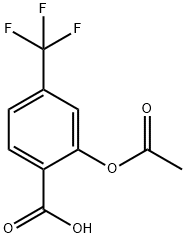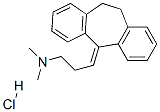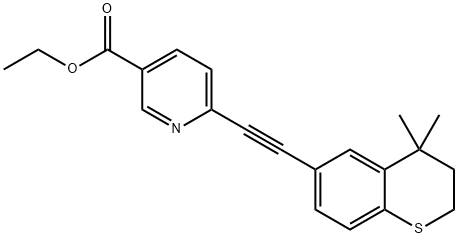Triflusal , 97% , 322-79-2
Synonym(s):
α,α,α-trifluoro-2,4-cresotic acid acetate;2-(Acetyloxy)-4-(trifluoromethyl)benzoic acid;acetyl-4-trifluoromethylsalicylic acid;Drisgen;Triflusal
CAS NO.:322-79-2
Empirical Formula: C10H7F3O4
Molecular Weight: 248.16
MDL number: MFCD00866793
EINECS: 206-297-5
| Pack Size | Price | Stock | Quantity |
| 250mg | RMB788.00 | In Stock |
|
| 1g | RMB2371.20 | In Stock |
|
| others | Enquire |
PRODUCT Properties
| Melting point: | 120-122° (upon slow heating); 110-112° (upon quick heating) |
| Boiling point: | 316.0±42.0 °C(Predicted) |
| Density | 1.433±0.06 g/cm3(Predicted) |
| storage temp. | Sealed in dry,2-8°C |
| solubility | DMSO: >30mg/mL |
| pka | 2.97±0.10(Predicted) |
| form | powder |
| color | white to off-white |
| λmax | 297nm(H2O)(lit.) |
| Merck | 14,9688 |
Description and Uses
Triflusal is an antiplatelet agent structurally related to the salicylates, but it is not derived from ASA. Triflusal and its metabolite (3-hydroxy-4-triuoro-methylbenzoic acid or HTB) produce specic inhibition of platelet arachidonic acid metabolism (McNeely and Goa, 1998). A single 12-month open-label trial of Triflusal in 73 VaD patients (López-Pousa et al., 1997) showed fewer declines in MMSE scores in the active group compared with untreated subjects. More recently, Triflusal was used in patients with amnesic MCI; 257 patients were randomized to receive 900 mg of Triflusal or placebo for 18 months. Triflusal therapy was associated with a signicantly lower rate of conversion to dementia (Gómez-Isla et al., 2008).
An analog of Aspirin; inhibits platelet aggregation. Antithrombotic.
Safety
| Symbol(GHS) |  GHS07 |
| Signal word | Warning |
| Hazard statements | H302-H315-H317-H319-H335 |
| Precautionary statements | P261-P264-P280-P280-P304+P340+P312-P333+P313 |
| Hazard Codes | Xn |
| Risk Statements | 22-36/37/38-43 |
| Safety Statements | 26-36/37 |
| WGK Germany | 3 |
| RTECS | GP4250000 |
| HS Code | 2918.29.7500 |






